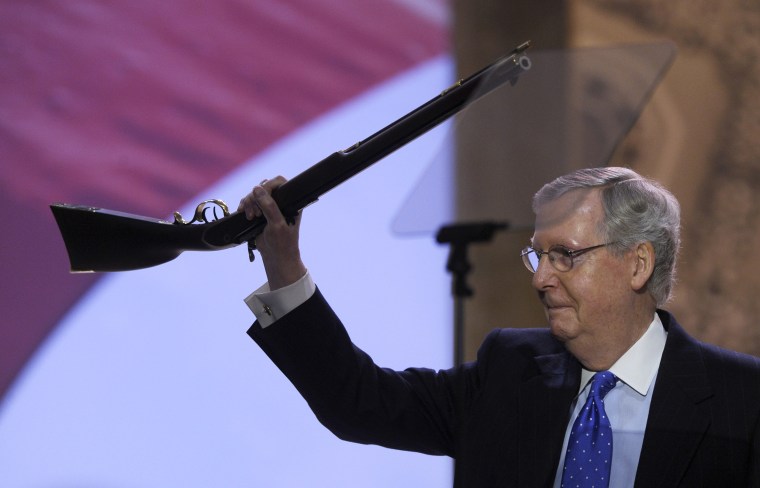WASHINGTON — Senate Majority Leader Mitch McConnell, R-Ky., has come under increased pressure to act after two mass shootings over the weekend, but calls for legislative action to respond to gun violence is nothing new to the longtime GOP leader — and neither is his resistance to such solutions.
McConnell has been a fierce opponent of gun restrictions throughout his 35-year Senate career and has reaped the benefits of a close relationship with the National Rifle Association.
Now he is resisting calls by Democrats to bring lawmakers back to Washington during the five-week August recess to vote on a bill passed by the House that would expand background checks.
Republicans on Capitol Hill have no reason to believe that McConnell, who is home resting from a fall in which he fractured his shoulder, would call the Senate back into session. After all, he has opposed legislation in the aftermath of every previous mass shooting, with familiar arguments.
After a mass shooting at the Standard Gravue printing plant in Kentucky in 1989, McConnell, then a freshman senator, said, “We need to be careful about legislating in the middle of a crisis.”
Twenty-eight years later, after a shooter killed 59 people in Las Vegas, his response was that "the investigation has not even been completed. And I think it’s premature to be discussing legislative solutions, if there are any.”
And when 20 children and six educators were killed at Sandy Hook Elementary School in 2012, McConnell said the incident “stands out in its awfulness,” but then used attempts to expand background checks and discussion about reinstituting a ban on semi-automatic guns as a campaign issue.
During his 2014 re-election effort, his campaign issued a robocall in Kentucky in January of 2013, one month after Sandy Hook, saying that President Barack Obama and the Democrats were “doing everything in their power to restrict your constitutional right to keep and bear arms,” according to an audio recording posted to YouTube by a now defunct group called Progress Kentucky.
McConnell has long been a champion of the NRA, consistently receiving an “A” rating from the gun rights group. Over his career, he’s received more that $1.2 million in campaign contributions from the gun rights group.
The NRA has also almost exclusively donated to Republicans, including more than $800,000 in the 2018 election alone, not including $10 million in lobbying and $9 million in television and other electioneering in support of Republican candidates and $4 million of that spent on opposing Democrats, according to the Center for Responsive Politics. It's a pattern that was replicated in previous election cycles.
That, in turn, contributed to electing Republicans and helped McConnell hold on to his GOP majority in the Senate.
Most recently, McConnell has refused to bring two incremental pieces of legislation with broad bipartisan support to the Senate.
He resisted calls to put the Fix NICS legislation up for a vote in the Senate, despite having more than 50 bipartisan co-sponsors. At the time, the second highest Republican, Sen. John Cornyn of Texas, told NBC News that it would get 80 votes if the majority leader would allow it to have a vote.
Fix NICS is an extremely narrow legislation that would incentivize states to upload data to the National Instant Background Check system. McConnell never did bring it to the floor but it was included in an appropriations bill that eventually passed.
McConnell has faced recent criticism on another front as well, being tagged “Moscow Mitch” by critics after refusing to put election security bills on the floor. Now, critics on Twitter have adopted #MassacreMitch because of his resistance to bringing forward a bill passed by the House that would expand background checks.
After the mass shootings in Texas and Ohio over the weekend, McConnell hedged slightly when President Donald Trump made a public statement calling for a minor change to gun related oversight, known as red flag laws, as well as a look at video games. But McConnell made no concrete promises, only directing Republican committee chairs to explore ways “to help protect our communities without infringing on Americans’ constitutional rights.”


